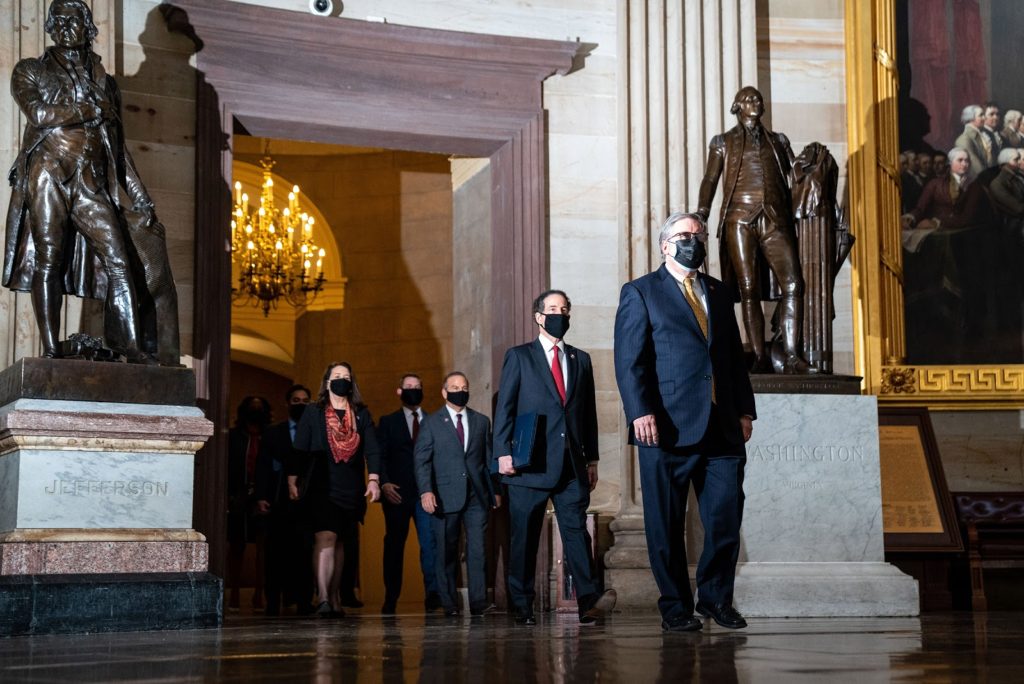Trump Acquitted in Second Impeachment

Image courtesy of Time Magazine
By Margaret Adams
Donald Trump’s historic second impeachment ended on Saturday with his acquittal, votes landing at 57-43. The House of Representatives voted to impeach him on January 13 for his role in inciting the riot at the Capitol on January 6.
“Donald John Trump engaged in high Crimes and Misdemeanors by inciting violence against the Government of the United States,” the impeachment article, which was submitted to the Senate on January 16, states.
Rep. Jamie Raskin (D-Md.) was the lead impeachment manager and the primary author of the impeachment article, along with Democratic Representatives David Cicilline, Ted Lieu, Diana DeGette, Eric Swalwell, Joaquin Castro, Joe Neguse, Madeleine Dean, and Stacey Plaskett.
Trump’s defense team included attorneys Michael van der Veen, Bruce Castor, and David Schoen, who stated in their brief that Trump’s words were protected under the First Amendment and free speech is unimpeachable. They also notably claimed that Democrats suffer from “Trump Derangement Syndrome,” which sought to “silence a political opponent and a minority party” and “hunger for this political theater” that would be “a danger to our Republic democracy and the rights that we hold dear.”
Trump was invited to testify in the trial by Raskin on February 4; Trump’s lawyers declined on his behalf, calling the House’s request for Trump’s testimony “a public relations stunt.”
The trial started on February 9 with Rep. Rand Paul (R-Texas) who forced a vote to dismiss the charge of incitement, as Trump is no longer president.
The motion was denied in a 55-45 vote, with all Democrat representatives, both independent representatives, and five Republicans (Susan Collins, Lisa Murkowski, Mitt Romney, Ben Sasse, and Pat Toomey), making this the first time in history that a former president has been tried for impeachment.
Democrats built an emotionally charged case based on the claim that Trump “summoned the mob, assembled the mob, and lit the flame of this attack.”
The prosecution relied heavily on audio and video evidence of Trump, including his call to Georgia’s Secretary of State Brad Raffenspurger (R), as well as police bodycam footage of rioters yelling, “Hang Mike Pence.”
“They were talking about assassinating the vice president of the United States,” said Delegate for the Virgin Islands Stacey Plaskett (D), who is also the impeachment manager. “They did it because Donald Trump sent them.”
Van der Veer argued that Trump could not be charged with incitement if the riot was already planned and that his right to free speech was protected under the First Amendment. The defense also relied on video evidence, including the instances of riots and looting that occurred in the Black Lives Matter protests in Portland, as well as a video of Senate Majority Leader Chuck Schumer (D-NY) threatening Supreme Court Justices Kavanaugh and Gorsuch at a pro-abortion rights rally in March 2020. These videos were used to demonstrate the Democrats’ rhetoric to the unrest as an example of hypocrisy.
Democrats submitted a written statement by Washington Rep. Jaime Herrera Beutler (R), who noted her knowledge of an explicit phone call between the former President and House Republican leader, Kevin McCarthy. The call, which took place during the insurrection at the Capitol, was provided as evidence of Trump’s role in the insurrection.
“Well, Kevin, I guess these people are more upset about the election than you are,” Trump said, according to lawmakers who were told about the call from McCarthy.
“You have to look at what he did during the insurrection to confirm where his mind was at,” Herrera Beutler told CNN of the phone call. “That line right there demonstrates to me that either he didn’t care, which is impeachable, because you cannot allow an attack on your soil, or he wanted it to happen and was OK with it, which makes me so angry.”
Minority Leader Mitch McConnell (R-Ky.) also took part in placing blame on Trump for “disgraceful dereliction of duty” during the trial.
“The Senate’s decision today does not condone anything that happened on or before that terrible day,” McConnell said. “It simply shows that senators did what the former President failed to do. We put our constitutional duty first.”
Trump was acquitted with a vote of 57-43, lacking the two-thirds majority requirement. Seven Republican senators voted that Trump was guilty of incitement, which is the largest bipartisan vote for an impeachment conviction of a U.S. president. The Republicans were Richard Burr, Bill Cassidy, Susan Collins, Lisa Murkowski, Mitt Romney, Ben Sasse, and Pat Toomey.
Louisiana senator, Bill Cassidy tweeted a video of his reasoning for being one of the seven Republicans who voted Trump guilty.
“The President promoted unfounded conspiracy theories to cast doubt on the integrity of a free and fair election because he did not like the results,” Senator Burr of North Carolina said of his surprising vote for Trump’s conviction. “As Congress met to certify the election results, the President directed his supporters to go to the Capitol to disrupt the lawful proceedings required by the Constitution. When the crowd became violent, the President used his office to first inflame the situation instead of immediately calling for an end to the assault.”
“While the final vote did not lead to a conviction, the substance of the charge is not in dispute. Even those opposed to the conviction, like Senate Minority Leader McConnell, believe Donald Trump was guilty of a ‘disgraceful dereliction of duty’ and ‘practically and morally responsible for provoking’ the violence unleashed on the Capitol,” Biden said after Trump’s acquittal.
Van der Veen interviewed with CBS on Saturday claiming that House impeachment managers manipulated evidence to further incriminate Trump.
“The reality is this: If this wasn’t a kangaroo court, you’d have the Republicans clamoring to go after the supposed prosecution for literally manufacturing evidence,” he said. “I mean, imagine any prosecutor in America was caught manufacturing evidence against a witness. That would be a jailable offense. They would be disbarred, they’d be thrown out of their positions, they’d be impeached. That’s what should happen here, when they’re manufacturing, putting up fake blue check marks, altering tweets, doing all these things for effect.”
Though Trump is acquitted, his role in multiple court cases concerning his part in the insurrection of January 6 is not yet over. The NAACP, Rep. Bennie Thompson (D-Miss.), and civil rights law firm Cohen Milstein Sellers & Toll filed a lawsuit on Tuesday morning against the former president, Rudy Giuliani, and two white supremacist groups for violating the Ku Klux Klan Act. Many of the rioters who took part in the January 6 insurrection are also being prosecuted, and often cite Trump’s words of support for their involvement.







